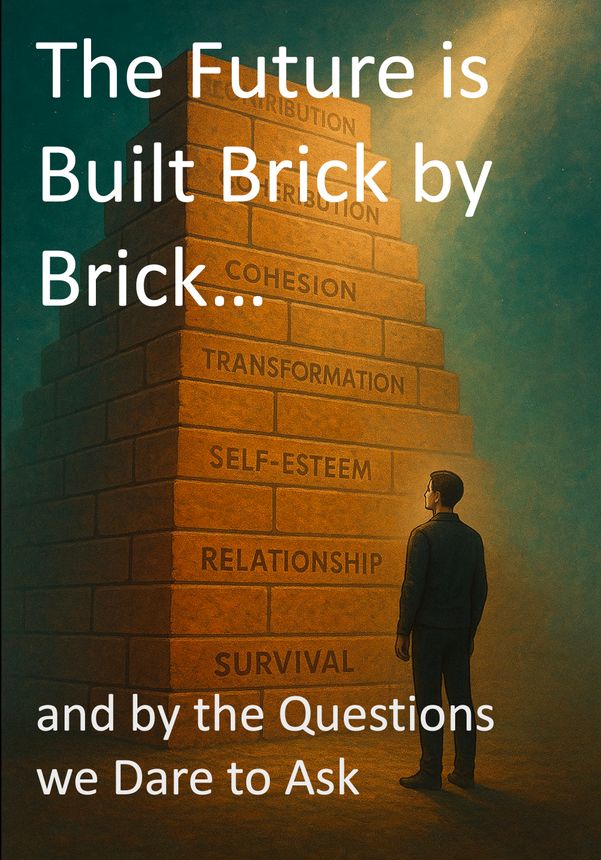What if the greatest risk we face with AI isn’t technical at all — but human?
AI is advancing on an exponential curve. Change that once unfolded over decades now happens in months. Like an arrow loosed from a bow, once this acceleration is underway, course correction becomes almost impossible. The future direction will be set not by the answers AI gives us, but by the questions we choose to ask — now.
The Brick Wall of Consciousness
Many people are familiar with Maslow’s hierarchy of needs. Richard Barrett extended this idea into the 7 Levels of Consciousness, showing how individuals, organisations, and societies evolve.
Here’s the crucial insight: these levels are sequential. You cannot leapfrog them. Each is like a course of bricks in a wall, resting on the stability of the ones below. Survival is not “less than” Relationship; it is foundational. But if you never build beyond it, the wall cannot rise.
- Level 1: Survival – safety, security, control, “just getting by.”
- Level 2: Relationship – belonging, trust, empathy, community.
- Higher levels (Self-Esteem, Transformation, Cohesion, Contribution, Service) build on these foundations.
Right now, much of the AI conversation is stuck at Level 1: Survival. The vocabulary reflects it: fear, scarcity, instability, powerless, threatened. Headlines echo it: “Will AI take my job?” “How do I protect myself?” “What if machines replace us?”
These are real concerns. But if fear defines the future, it will trap us at the base of the wall.
From Survival to Relationship
The step forward is Level 2: Relationship. Here, the vocabulary shifts: trust, empathy, belonging, “we’re in this together.” Instead of fear-driven self-preservation, the focus becomes cooperation, connection, and mutual support.
Reciprocity is the foundation, the recognition that survival is not just individual but collective: “If I help you today, you’ll help me tomorrow. We rise together.”
But reciprocity alone isn’t enough. To truly progress into Relationship, we must also reconnect with our sense of purpose and the core values that give meaning to our lives and work. Without clarity on what we value, we drift, pulled by distraction, fear, or the loudest voices around us. With values-awareness, however, we gain a compass:
- Greater clarity and confidence in decision-making.
- Increased motivation and engagement in what matters.
- Improved well-being and reduced stress by living more authentically.
- Stronger relationships, because we can express needs and appreciate differences.
- Greater resilience in challenges, anchored by our “why.”
Together with reciprocity, empathy, belonging, authenticity, and communication, this values-awareness transforms the mindset of “I must protect what’s mine” into “We thrive by supporting one another.”
When Questions Change Outcomes
History shows that the questions we ask can define our trajectory:
- Kodak asked, “How do we protect film?” and missed the digital revolution.
- Contrast this with Buurtzorg in the Netherlands, who asked, “How do we give nurses more time to care?” Instead of layering on more bureaucracy, they built a healthcare model supported by a simple digital platform (BuurtzorgWeb) that reduced administrative burdens and gave nurses freedom to focus on relationships, trust, and genuine presence with patients.
Elsewhere, organisations are experimenting with AI in a similar spirit:
- Education: Carnegie Mellon University AI tutors free professors to focus on mentorship and resilience, shifting from “How do we deliver more content?” to “How do we help students grow?”
- Healthcare: The University of California San Francisco (UCSF) AI assistant “Ava” answers routine oncology questions so nurses can focus on compassion. The underlying question: “How do we use AI to build trust, not just efficiency?”
- Local Government: Cities like Helsinki are piloting AI to increase citizen engagement, asking not “How do we cut costs?” but “How do we make democracy more participatory?”
The difference is in the framing. A survival question narrows the horizon. A relationship-and-purpose question opens a new one.
Escaping the Trap of Fear-Based Narratives
Part of the challenge is that public discourse about AI is shaped by media narratives — and fear sells. Headlines about “robots stealing jobs” or “machines taking over” amplify anxiety and keep us stuck in Survival mode.
This distortion matters. If the story is always about threat, people will resist change rather than shape it. Societies may double down on control, surveillance, and scarcity thinking — the very outcomes we most fear.
The antidote? Ask better questions about the stories we are told:
- Who benefits from framing this as a threat?
- What perspectives are missing from the narrative?
- How could this story be reframed to highlight human possibility, not just risk?
- What level of consciousness is this narrative promoting: Survival, Relationship, or beyond?
If we are conscious about the stories we consume and the values they reflect, we are freer to choose the future we want.
The Choice Before Us
AI is a lever. It can push us deeper into Survival — toward control, competition, and fear. Or it can free us to invest in Relationship, empathy, trust, belonging, and purpose.
But here’s the warning: with exponential acceleration, the long-term arrives quickly. If we do not choose the direction now, we may find ourselves locked into a fear-shaped future before we even realise it.
That’s why the questions matter. They are not optional. They are urgent.
Reflective Questions
- What kind of future do we want AI to serve: one built on fear, or one built on trust and belonging?
- Where in your own life are you operating from Survival (fear, scarcity, protection), and what would it look like to take one step toward Relationship (trust, empathy, community)?
- How might you design your work, leadership, or community to strengthen reciprocity, empathy, and purpose — not just efficiency and control?
- What distorted stories about AI are you consuming, and how might you reframe them?
- Which of your personal values feels most important to you right now, and how does it shape your sense of purpose?
Closing Thought
Machines will keep accelerating. That much is inevitable. But the future will not be written by processors — it will be written by the values and questions we dare to ask.
If we remain in Survival, those questions will shrink to fear and protection.
If we step into Relationship, guided by purpose, those questions will expand to trust, community, and belonging.
Because in the age of AI, the most important question is not what can be automated — but what kind of humanity, guided by our deepest values and sense of purpose, do we want to build?
 unknownx500
unknownx500

